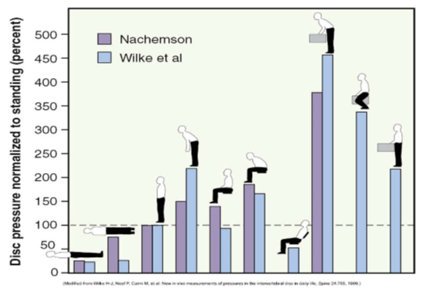I suffered a herniated disc by foolishly jumping off a large drop while camping. It has been the most serious injury of my life to date. As it invaded almost every aspect of my life, my mood, my career, my friendships, it gave me lots of pause to reflect. This is what learned and wrote after 3 months. However in the end it took me 2 years to be pain free, at which point I wrote a follow up “4 more lessons learned” which also contains more practical lessons than the more abstracted ones here.
 Postures and their disc pressures. My experience is closer to the Nachemson measurement than the Wilke, as I find that standing is a lot less pressurizing than sitting.
Postures and their disc pressures. My experience is closer to the Nachemson measurement than the Wilke, as I find that standing is a lot less pressurizing than sitting.
You'll probably find that laying on your back or stomach are the least painful positions, less than standing, and much less than sitting—and research agrees (see graphic 1). However sitting is really import in a society whose greatest challenge is a sedentary lifestyle. For instance, you can't work in a default desk-centric setting. While the price point for a standing desk is relatively low, it'll be a while until you heal enough to be able to stand all day. On the other hand, to comfortably work laying down all day is a different type of investment that won't blend into office life easily.
In addition travelling becomes complicated. Car trips, even when you aren't driving can be painful. Bicycling might start to be tolerable, but only after some time. A train, tram or bus offer some relief with their options to travel while standing. However the mere thought of sitting in an airplane for several hours is torturous.
You do heal, but sometimes you get worse too. The centrality of the back in the body means that few movements are free from danger. Once I leaned too much when putting on my underwear, felt a snap-slip, and set myself back a week's progress. A month later I went to a job interview which involved 5 hours of sitting, which regressed me another 2 weeks. And when you do finally feel relief, there exists another trap. It's easy to mistake temporary moments of no pain, for being better. Classic mistakes are going back to sport or the office chair too early and re-triggering the injury. Even a hopeful return to side-sleeping are can surprise you with painful middle of the night wake-up.
Healing time estimates for herniated discs range from 6 months to 2 years. Therefore you'll probably develop some sort of depression from your limited subset of activities. My typical way to combat depression, you would imagine, is being with your friends. Yet a herniated disc can affect this too, as a lot of standard hangouts, such as getting dinner, turn out to be exercises in pain endurance. Watching TV is another easy way to pass the time on the floor, but can intensify the isolation after months on end. I found that I had to take as much pleasure as I could from walks around my house.
McKenzie or Williams? Should you backbend to "squeeze in" the herniation? Or forward bend to "vacuum in" the disc liquid? Theories about how the mechanics of disc healing are an unresolved academic debate that leave no confidence in the sufferer. I had to stop "training my back to tolerate some flexion" and also stop trying to backend my way to impingement-free lifestyle. Finding the right therapeutic exercise is unfortunately a process of self-discovery.
If it were about rehabing in the gym it would be easy. Rather, it seems at the beginning that a better option would be to attempt full immobility. Sadly without any exercise, depression is likely to increase. This goes for sleep too, whose only pain-free position of on-the-back-with-a-lumbar-towel-roll might take time to adjust to and make for lost sleep. Walking is likely to be the first and only active exercise that is tolerable once you manage to make it out of muscle-spasms. Be prepared to re-appreciate the lost art of long walks.
Through not being able to live my life as I wanted too I became much more acquainted with the disability-rights activist attitude that everyone is disabled, only some people haven't discovered their disability yet. Healing a herniated disc is not easy or intuitive, it's a matter of reconfiguring your lifestyle, and it will stop you from taking the privilege of spinal health for granted.